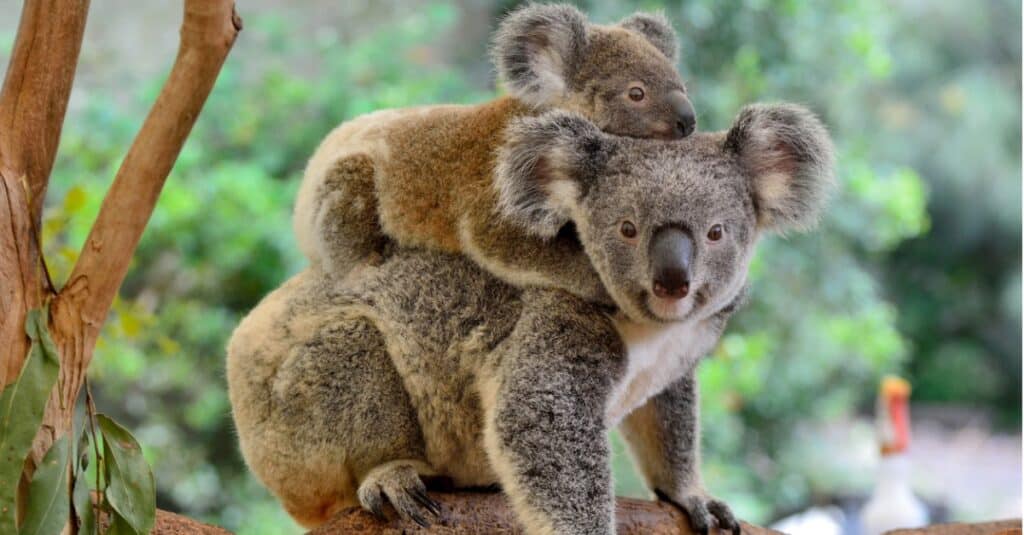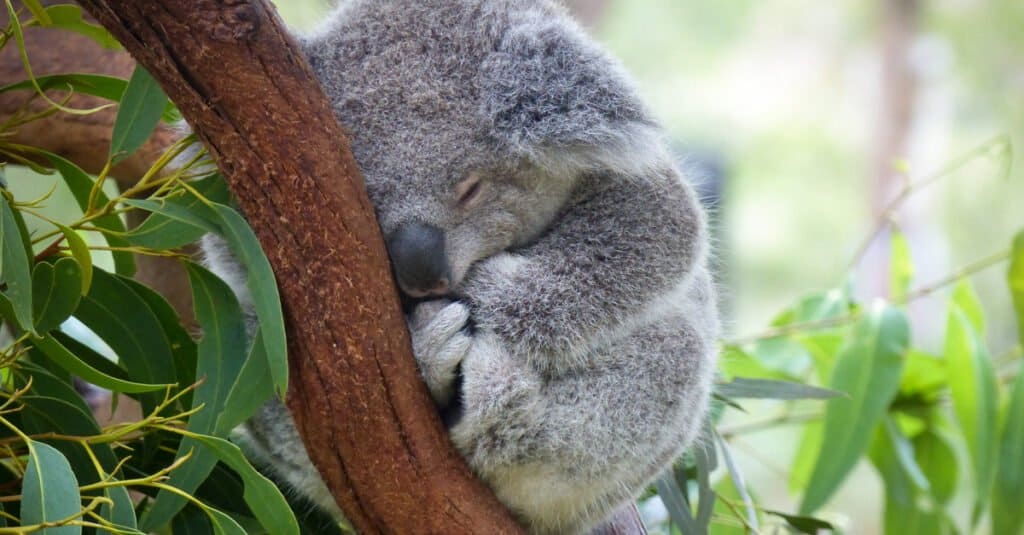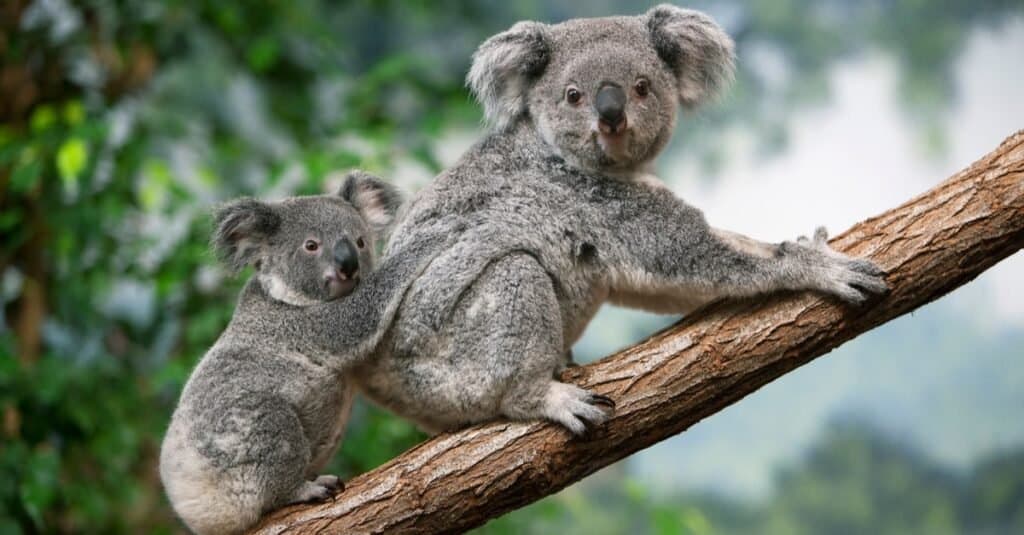Koalas are nocturnal animals. Also known as koala bears, these delightful creatures are native to Australia and are a national treasure. Although they have the word “bear” in their name, they are marsupials and love eating eucalyptus. Surprisingly, these animals sleep for 20 hours or more each day. This amount of sleep time is unusual, primarily typical for large predators rather than small mammals. So why do koalas sleep so long? This article explores the sleep behavior of koalas and examines their nocturnal behavior.
Koalas Are Nocturnal

Alizada Studios/Shutterstock.com
Koala bears sleep for 20 hours or more each day. This lengthy sleeping behavior makes it difficult to determine whether they are nocturnal or diurnal because they sleep most of the day and night. But koalas are primarily active at night, dusk, and dawn. Because of this, they are nocturnal animals. Koalas sometimes move around during the day, but they will only do this if something disturbs them. For example, if they are too hot or cold, or need to find a different tree to sleep in, then they will move.
Why Do Koalas Sleep So Much?
These animals love sleeping and are only active for four to five hours each day. During this time, koalas will eat and mate during mating season. This much sleep for a herbivore and marsupial is unusual. It is similar to the amount of sleep necessary for large carnivores. Herbivores usually spend much of their day grazing and looking for food. Many herbivores, like zebras, only sleep for five minutes each day. This time is drastically lower than what a koala needs to rest.
Slow Metabolism
Koalas sleep for 20 hours each day because of their slow metabolism. These marsupials must maintain slow metabolic rates to conserve their energy. Koalas slow their metabolism by lying motionless on trees before they doze off. This inertia is similar to how hibernating animals behave during winter. Many hibernating animals also need to conserve their energy. They save their energy by moving as little as possible or not at all and slowing their metabolism.
Eucalyptus Leaves Are Difficult To Digest

Richard A Wall/Shutterstock.com
Koalas also sleep for long periods because of their diet. They only eat eucalyptus leaves, which are low in calories. Because of this, they must conserve their energy by sleeping to survive. Koalas also sleep for 20 hours a day because of their digestion. Sleeping helps all creatures digest their food correctly, and their long sleeping periods result from their food source.
Eucalyptus leaves are low in energy and are also poisonous. However, the toxins in the leaves do not affect the koalas. They must, however, digest the leaves efficiently to gain the nutrients and energy they need from this toxic food source. If koalas did not sleep so long, they would become very weak and eventually die.
Koalas May Sleep a Lot, but They Are Alert
Although these animals are notoriously sleepy, they are alert to what is happening in their surroundings, even when resting. A koala will swiftly move to a safer space if it notices potential danger. They can also move away from predators, but only into trees if they are under attack. Koalas prefer being in trees, offering the safest place to sleep and eat.
When koalas are on the ground, they place themselves at risk because they cannot outrun fast predators like dingoes. This risk is why koalas rarely choose to descend to ground level. The only time koalas are on the ground is when they want to move to a different tree.
Because koalas sleep for long periods, people often compare them to sloths, but koalas are not as slow as sloths. Koala bears may not be fast and agile, but they are also far more nimble than the sluggish sloth on the ground or in the trees.
Koalas Have Poor Vision and Rely on Other Senses To Navigate at Night

slowmotiongli/Shutterstock.com
As koalas are nocturnal animals, you might expect them to have good night vision, but this is not the case. Koala bears have small eyes compared to their other sensory features, such as their nose and ears. Their eyes are not highly developed, so they rely heavily on smelling and hearing.
Koala bears have large, leathery noses, a distinctive feature of this animal. Their large noses are highly developed to detect smells and can even sense different levels of toxins in eucalyptus leaves. This ability is helpful as they can avoid leaves with exceptionally high levels of poison.
Koalas also use their strong smell to detect predators and pick up scent warnings left in trees by other koalas. Koala bears produce scent warnings to mark their territory. Scientists believe koalas are born with a strong sense of smell, as the joeys, blind and premature, can travel to the pouch by smelling the milk in its mother’s teats. Koalas also have large ears that are highly developed to detect sounds that could signal danger.
How Can Koalas Eat Poisonous Eucalyptus Leaves and Survive?
Eucalyptus leaves are toxic but are the sole component of the koala’s diet. These marsupials can eat eucalyptus leaves because they have a particular enzyme called cytochrome P540. This enzyme enables the koala to digest the leaves without any side effects from their toxins. Interestingly, koalas even prefer certain types of eucalyptus trees. Although these leaves are low in calories and energy, they are high in protein and water. Because of this, younger and smaller koala bears can get their necessary water and nutrition solely from eucalyptus leaves. These trees are also common in Australia, providing the country’s national treasure with a convenient food source and place to sleep.
Nocturnal vs. Diurnal: What’s The Difference?
Navigate to Nocturnal vs. Diurnal: What’s The Difference? for further information about the nocturnal and diurnal phenomenon in various living creatures.
Up Next – All About Koalas
- Koala Animal Facts
- Koala Teeth: Everything You Need to Know
- Koalas to “Vax Up” Against Chlamydia
- What’s a Baby Koala Called + 4 More Amazing Facts and Pictures!
The post Are Koalas Nocturnal Or Diurnal? Their Sleep Behavior Explained appeared first on AZ Animals.
from Animal News, Facts, Rankings, and More! - AZ Animals https://ift.tt/IC5E7jT